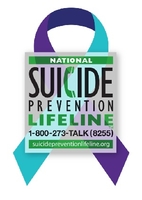April 24, 2019 - The American Foundation for Suicide Prevention reports that each day an average of 129 suicides occur. This makes suicide the 10th leading cause of death for Americans. With spring being the peak time of year for suicidal actions, we hope to bring attention to this phenomenon and connect those in need to the resources that can help them overcome thoughts of self-harm.
One of the best tools we can use to reduce the annual suicide rate is knowledge. By understanding the warning signs and knowing what to do when someone may be in crisis, we are better prepared to get help for those who are suffering. So, what are some of the things we should be looking for when we’re concerned about someone’s wellbeing?
The National Suicide Prevention Lifeline 1-800-273-TALK (8255) provides a wealth of resources to both those in need of support as well as those who want to know how to help. They identify several risks of suicidal behavior including loss of a job or financial burden, serious physical illness, impulsive or aggressive tendencies, family history of suicide, lack of healthcare, and history of trauma or abuse, to name a few. They also suggest that if you hear someone talking about wanting to die, talking about being a burden, suddenly withdrawing or isolating, or acting recklessly to be aware that these are warning signs that someone may be at risk for suicide.
But what should you do if someone you know is exhibiting risky behavior or making statements about self-harm? It doesn’t hurt to talk about it. In fact, talking about it helps the person feel heard and not so isolated. Spend time listening and offer support and reassurance. Encourage the person to seek professional help and remind them that there is hope. The National Suicide Prevention Lifeline: 1-800-273-TALK (8255) is a free and supportive resource for both those who are in crisis and those looking to help. If you are with someone who is at risk of harming themselves, offer to make the call with them. If the person appears to be in immediate danger, don’t hesitate to call 9-1-1.
As with most mental health conditions, suicide is often not talked about. We can change this and in turn, bring awareness to the resources available, helping those in crisis get connected to support. By knowing the warning signs, and being ready to listen, you may save a life.
When feeling unsafe or in a crisis:
National Suicide Prevention Crisis Hotline: 1-800-273-TALK (8255)
Southeastern Mental Health Authority Crisis Hotline: (860) 886-9302
Text: 741741

